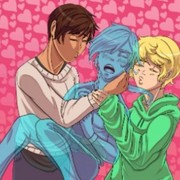He had begun to think that Calidore and the Queen had forgotten him when he saw the tall slender courtier in his gilded armour cutting through the crowd toward him. Sir Thomas followed in his wake, and this time, among the fair grotesquery of the Lordly Folk, John recognised him as a fellow mortal. So that was the meaning of Sir Thomas’s northern accent.
Sir Calidore said to John, “Sir, this is Thomas Lene, who was once a mortal like yourself, and is now a knight in the service of Faerie.”
“John-a-Dale! We are old companions, Calidore.” Sir Thomas grinned at John and gripped his hand. “So it is useless to seek the Rose? I feared it. And now Calidore tells me you have asked for knightly aid.”
“If it would avail.”
“Storm the Dark Tower using elfin arms!” Thomas rubbed his pointed beard. “A lighter thing in the word than the action, I think. Calidore, has it been done before?”
The faerie knight stifled a cough. “I could not possibly say in the circumstances,” and he tilted his head meaningfully at John.
“Humour me, friend,” Sir Thomas persisted. “If it had been done before, how might it have been done?”
Calidore gave the young knight a sour look. “Regardless of how it might or might not have been done in the past, sir, I think that for the future, one might attempt a ransom.”
John recalled the words of the thing-that-had-not-been-Janet. “It will be a costly ransom, master. I begged the Witch to let me have my bride back. She demanded kingdoms and slaves. Things I do not have and cannot give.”
Sir Calidore frowned. “And think you we will pay this ransom?”
“No,” John insisted. There was a pressure, like a headache, building up behind his eyes. “I thought you would ride to the tower, breach its walls, fling the place down stone by stone, and set the prisoners free. That was what I thought.”
Sir Thomas and Sir Calidore stood looking at him for a few silent moments. Then Thomas swung around to Calidore.
“We might spare a little money for a ransom, surely.”
“We might,” said Calidore, “but you must know the Witch has no use for mere money.”
“You have given me no answer,” John broke in. “I will not bargain with the Witch. I will not enrich her at my or anyone else’s expense. I mean to destroy her.”
“Destroy her?” Calidore’s eyebrows crawled up his forehead. “Oh, that would be unwise, sir. Criminal folly, and not to be thought of.”
“The more folly to leave her in peace, surely? Who might she steal next? The Queen herself?”
Calidore gave a quick offended cock of his head. “Oh, I think not. Not while the peace is kept. There are certain—diplomatic safeguards in place which make that unlikely. Therefore I say it is folly to defy the Witch to battle. But you are only a mortal, sir; it is easy for you to come into Faerie and begin a war. Come victory or defeat, home you go again, to your quiet and peaceful village, and leave us to repair the damage.”
“Just so,” Sir Thomas put in eagerly. “Moreover, no one has ever broken the Witch’s enchantments. Neither by cunning nor craft nor horse.”
“Indeed.” Calidore clasped his hands behind his back, rising up a little on his toes, the better to stare down at John. “You must not suppose, sir, that you are the first gentleman to lose a lady to the Dark Tower.”
John looked at him with disgust. “You are afraid of her. Both of you.”
Sir Thomas burst into laughter. “Plainly put.”
But Calidore became still more rigid. “Afraid? I’ll make him eat the words who says so.”
John sighed and lifted both hands. “Then I take them back: be content.”
“Call us prudent, rather. Where is the good in provoking our most powerful enemy to destroy us?”
There was sense in Calidore’s words, even he could see that. But now what? Wander the world, looking for the Rose? He might die of old age before he found it.
“Nay, take heart,” said Sir Thomas. “There may be some way of arranging a ransom. Surely, Calidore?”
“I will broach it with the Queen,” Sir Calidore said. “But, sir, you may find the price higher than you are willing to pay.”
“Let me hear any offer.”
“I will broach it with the Queen,” Calidore repeated, and stepped down from the dais.
To hide the impatience which gnawed, like the Spartan’s fox, on his innards, John willed himself not to stare after the faerie knight. Instead he turned to Sir Thomas. “You speak like a Scot, friend.”
Thomas Lene smiled. “Salcraig.”
“Derbyshire. How long have you lived in Faerie?”
The mortal knight gave a wave of his hand. “Oh, there’s no keeping track of the time here.”
“Save for the seventh years.”
Sir Thomas laughed. “Save for the seventh years… Mind you, John, there are times when I long for a sight of Ettrick Water again, and, aye, for the good steady chime of a church bell striking the noonday! But the price is one I pay willingly. A man might while away seven mortal lifetimes here in pastime and fair company.”
John grimaced. “But what would he have when they were done?”
“What but youth, strength, and fair memories?”
“Indeed!” John studied the other mortal’s face, which must once have been well-favoured, but now seemed so slack and pale.
Sir Thomas dropped his voice. “The Queen has taken a fancy to you, John. Calidore’s sour face bears this dude i know to that. And no wonder, a fine figure of a lord as you are here. But what are you in Derbyshire? A farmer, maybe, or a craftsman, at the beck and call of every man? Why go back to that, when you might stay and please yourself, a high lord of Elfland?”
It was easy to find an answer to that. “Well, because I promised Parson Plumtree to shoe his horse on Monday.”
Sir Thomas blinked. “Your pardon?”
“I promised Parson Plumtree to—”
“I heard!” Thomas laughed. “You would turn your back on Faerie to keep a promise to shoe a horse?”
“Someone must shoe the Middleton Dale horses, and forge their ploughs, and mend their buckles.”
“But not men who were meant for something more.”
John remembered Sunday, in the church, when for the first time a good reason had struck him for leaving the Dale and seeing the world. Yes, and that was what had brought him to Faerie—the help and protection of his own.
“I came here only to fulfill a promise,” John said. “When I have done that, other promises will call me back. If I were to neglect them, would I have any worth here?”
Sir Thomas fell back a step and spread out his hands, as if offended. “It was but friendliness, John.”











Comments (0)
See all